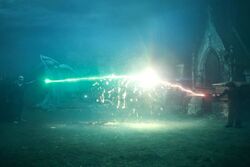
|
"Are you a wizard, or what?"
The title of this article is conjectural. Although it is based on canonical information, the actual name is a conjecture and may be supplanted at any time by additional information released from canonical sources. If this occurs, please move this page to the appropriate title. |
- "Subtle laws govern wand ownership, but the conquered wand will usually bend its will to its new master."
- — Mr. Ollivander[src]
Ownership of wands is governed by subtle laws which are not fully understood, even by those well-versed in Wandlore.
Allegiance
The most prominent rule that governs wandlore is that the wand chooses the wizard that it will work for. A wand choosing to work for a wizard is said to have given them its allegiance. When a wand has chosen its holder, they can be assured the best results with it.
Wands can be acquired in one of three general ways: by selecting a newly created wand (usually made by another), by winning a wand or by inheriting one. Each one of these relates to this law in a different way.
Initial selection
- "The wand chooses the wizard. That much has always been clear to those of us who have studied wandlore... If you are any wizard at all you will be able to channel your magic through almost any instrument. The best results, however, must always come where there is the strongest affinity between wizard and wand. These connections are complex. An initial attraction, and then a mutual quest for experience, the wand learning from the wizard, the wizard from the wand."
- — Mr. Ollivander[src]
Normally, a witch or wizard's first wand will be a newly created or "virgin" wand, obtained from an established wandmaker such as Ollivander's and they will usually have to test a number of potential virgin wands before they find the one that will give its allegiance to (or "choose") them. The precise reasons for which particular wands choose particular wizards is not clear, but certain wands seem to have a natural affinity for certain wizards or witches. It is most likely (given the similarities between known wizards/witches and their wands) that the wizards/witches with the most similar personalities to their prospective wands will have the highest affinities for them and so be most likely to be chosen by them. In other words, the more similar the holder is to the wand the more likely they are to be chosen by it.
Change of allegiance
- "I overpowered Draco weeks ago. I took this wand from him... Does the wand in your hand know its last master was Disarmed? Because if it does... I am the true master of the Elder Wand."
- — Harry Potter describing how he won both of Draco Malfoy's wands.[src]

One can also procure a wand by "winning" it from its master. Of course, it is always possible to simply steal/borrow another witch or wizard's wand and obtain fair results with it but its allegiance will only bend towards the new master when it is won. The holder of a wand whose allegiance has not been won may be noticeable to them as Hermione Granger was uncomfortable using Bellatrix Lestrange's wand[1].
To win a wand, one must defeat its master (e.g. by disarming or murdering them), though this does not apply to practice duels, in which being disarmed or defeated will not affect a wand's loyalty due to the perceived levity. However, it should be noted that wands develop an affinity to their owners that they will not give up easily; even when won, they will often retain some loyalty to the original owner. The only exception to this is the Elder Wand, which is "completely unsentimental" and will only be loyal to strength. In other words, when won, it switches its allegiance entirely.[2]
It should be noted that all wands owned by a defeated wizard will revert to the victor, even if they were not used in combat, such as when Harry Potter simultaneously became the master of both Draco Malfoy's wand and the Elder wand when he defeated Draco (who was the master of both and possessed only one of them on his person at the time).
Inheritance
In some families, wands may be inherited, such as Neville Longbottom using his father's wand and Ron Weasley using his brother Charlie's old wand. However, each of these cases ended with the wands being snapped in half, and both Neville and Ron were more successful using other wands, therefore making it questionable whether or not a wand's allegiance can truly be gained in this way.
Wand relation

Priori Incantatem between Harry Potter and Voldemort in 1995.
When the cores of two wands derive from the same source, they are referred to as "brothers". This has a number of profound effects.
Firstly, brother wands cannot be forced to duel against one another. Should two such wands ever come in the way of one another, a rare connection is formed called, Priori Incantatem. When the connection is formed, the wands battle to merge a golden orb into the other's shaft; the one that succeeds to force the orb in the other is the winning wand. Because of its rarity, most wizards never learn that such a connection is possible.
After two brother wands connect through means of Priori Incantatem, both wands come to know one another and may react towards the other's presence without the consent of their owners, or the winning wand only reacts towards the losing wand[3]. Also, under special conditions it is possible for one wand to recognize its brother's master, even when a different wand is used by them. For example, during the Battle over Little Whinging, Harry's wand recognized Voldemort and spurted "golden flames" at him, even though Voldemort was using Lucius Malfoy's wand at the time.[1]
